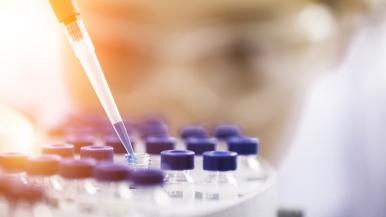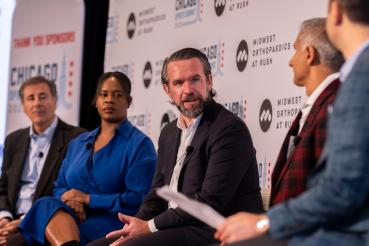A newly discovered class of genes may advance what we know about autism and the way the brain works, according to a study using data from the SPARK autism research project. Variations in these genes have a less severe effect on the brain and cause milder forms of autism than previously identified autism genes.
The study was among of a series of articles published in the journal Nature Genetics that used data from the Simons Powering Autism Research, or SPARK, project, of which RUSH University Medical Center is a participant. SPARK was created to advance understanding of the complex genetics of autism, and its research cohort includes genetic data from nearly 43,000 people with autism. The findings show differences in genetic influences among people all along the autism spectrum.
For the study, “Integrating de Novo and Inherited Variants in 42,607 Autism Cases Identifies Mutations in New Moderate-Effect Genes,” published Aug. 18, researchers analyzed the DNA from the largest-ever autism cohort, including 35,000 participants from the SPARK autism research project. They identified a group of novel “moderate-effect” genes that tend to contribute to autism through inherited variants.
It is widely known that autism has a genetic component, but previous studies have primarily identified autism genes with de novo variants — variants that occur spontaneously in cells — that are not inherited. Most of these variants are also implicated in other neurodevelopmental disorders, and have profound effects on the brain, causing intellectual delays and/or seizures. However, only 20% of individuals with autism have this type of genetic variant.
“For many years, we have known from twin studies that there must be inherited genetic variants that lead to autism, but we have not been able to systematically identify individual genes until now,” said Pamela Feliciano, PhD, SPARK’s scientific director and lead author of the study. “We have now identified a group of genes associated with autism, that can include inherited variants, which begin to explain a different part of the autism spectrum.”
To gain a better understanding of the full spectrum of autism genes, the researchers analyzed nearly 20,000 participants with autism, along with one or both of their biological parents, and found that roughly 20% of people with autism have de novo genetic variants that affect the function of the associated gene. Nearly 70% of this genetic contribution can be attributed to known autism or neurodevelopmental disorder genes.
However, this means that although known autism-associated genes are responsible for the majority of de novo variants, there are others still to be identified.
The researchers also added in another approximately 23,000 individuals with autism and 236,000 people without autism from the general population. In this meta-analysis, they identified 60 autism genes whose contribution to autism is largely driven by rare inherited “loss of function” variants transmitted by parents who do not have cognitive differences or autism. Of these genes, five had never been implicated in neurodevelopmental conditions.
Individuals with autism who carry inherited variants in these “moderate effect” genes are less likely to have cognitive differences than people with autism who carry variants in well-established autism genes.
“The majority of parents who passed down these genetic variants in our study do not have cognitive differences or autism, but we know that these genes are associated with autism because we find that these variants are more frequently inherited by children with autism,” Feliciano said. “We hypothesized that people with autism who have these inherited genetic variants are not as likely to have seizures and cognitive differences as people with de novo genetic variants. So far our data strongly support[s] this hypothesis.”
Additional studies using SPARK data
In a second study published by Nature Genetics on Aug. 18, “Rare Coding Variation Provides Insight into the Genetic Architecture and Phenotypic Context of Autism,” investigators analyzed genetic data from 20,627 people with autism, with new genetic data derived primarily from SPARK. The researchers, led by a team of investigators supported by the Simons Foundation Autism Research Initiative, or SFARI, and the Autism Sequencing Consortium, or ASC, identified 72 genes associated with autism, most evidence coming from de novo variants, with smaller but significant contributions from rare inherited variants. The researchers then combined data from the autism studies with a large dataset of 31,000 families in which the child was diagnosed with developmental delay and/or other neurodevelopmental conditions.
These analyses discovered 373 genes associated with these diverse neurodevelopmental outcomes and allowed the team to identify genes more associated with autism than with other neurodevelopmental conditions, and vice versa. They found that genes associated predominantly with developmental delay tend to be important in early neuronal development, whereas autism genes tend to play a role in more mature neurons.
Taking part in SPARK
The Autism Assessment, Research, Treatment and Services, or AARTS, Center at RUSH is an early and ongoing participant in the six-year-old SPARK project, enrolling participants in the DNA study. Those who enroll also can be connected to other autism studies relevant to them.
“Understanding the genetic pathway can help streamline our understanding of how a particular family might manage autism,” says psychologist Latha Soorya, PhD, director of the AARTS Center and an associate professor of psychiatry and behavioral sciences at RUSH. “We have the potential to get away from one label for autism. To have different ways of identifying different forms of autism drives research like SPARK."
RUSH continues to enroll participants in SPARK.
AARTS provides the comprehensive assessment and treatment of children, adolescents and adults with autism spectrum disorder. The center integrates clinical care with research to improve the mental health and quality of life of people with autism, as well as helping families and individuals find the support they need.
About SPARK and SFARI
SPARK (Simons Powering Autism Research), the world’s largest autism research study, has mobilized almost 300,000 participants including more than 100,000 people with autism to participate directly in scientific research, with more than 150,000 of their family members also enrolled as participants. The SPARK community brings together people with autism and the world’s leading autism researchers to drive research that is uncovering the genetic causes of autism and informing the development of targeted treatments and support. SPARK’s ultimate goal is to power research to help people with autism live their fullest lives. SFARI’s mission is to improve the understanding, diagnosis and treatment of autism spectrum disorders by funding innovative research of the highest quality and relevance.



